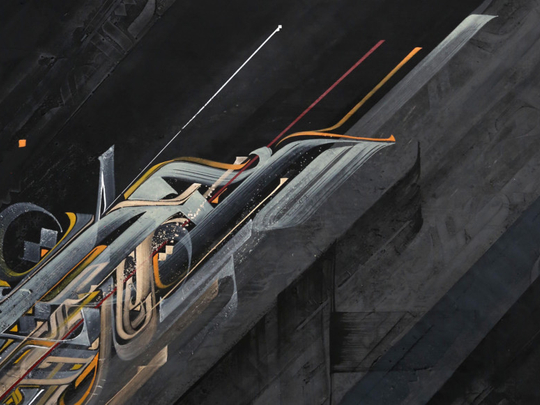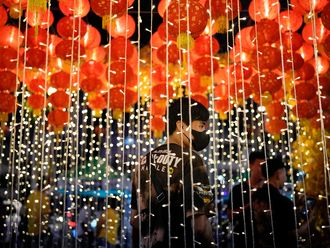
French artist Vincent Abadie Hafez began his journey as a street artist in the late 1980s under the pseudonym Zepha. The Toulouse-based artist is well-known for his unique style that combines graffiti with calligraphy. Through his street art, paintings, murals, etchings and engravings, the artist addresses themes such as growing urbanisation and the impact of our individual and collective actions on our planet.
In his first solo exhibition in Dubai, “Superplasticizer”, Zepha is exhibiting new works that explore the multicultural ethos of Dubai, and the thoughts and actions that support and sustain it. As a street artist, who makes work that responds to the built environment, Zepha has used superplasticiser mixed with the raw materials of the city itself such as cement, rubble and sand, collected from the streets of Dubai to create this body of work.
“Like people, construction materials also have yield points. In terms of flexibility and malleability, there is only so much they can take before something snaps. I tried to understand the city in the same way. Dubai is often dismissed as a plastic city, with a brittle fragility at its core. Yet when certain superplasticising polymers are added to fresh concrete paste, the result is a dramatically stronger material that is much less susceptible to stress. The superplasticiser also acts as a dispersant, spreading the gravel and sand evenly throughout the mixture and preventing particle segregation. Transposed to Dubai, the superplasticiser is an analogy for a kind of social glue and emotional intelligence that quietly holds together a truly multicultural, fully integrated city,” Zepha says.
The artist has used his unusual materials to create textured surfaces on his canvasses and covered them with spray paint and calligraphic brushstrokes to create evocative sculptural bas-relief works. In some works, he has painted directly on scraps of wood collected from a demolished house in Dubai. His abstract, calligraffiti artworks reflect Dubai’s ancient cultural heritage as well as its modern skyline. The titles of the works, such as “Earth is My Country and Humanity is My Family”; “Concrete Jungle”; “Sound Wave Frequency”, and “My Freedom is To Be What They Don’t Want Me To Be” offer insights into the thoughts and feelings the artist wants to convey.
This body of work is also a study of scarcity, speaking about a future world without oil and petrochemical-derived plastics. The artist has deliberately used water collected from the air-conditioners in the gallery to mix his materials; and by using local sand he alludes to the fact that despite all the sand in Dubai, only a very specific consistency is appropriate for making concrete, as a reminder that nothing is as abundant as it seems.
Jyoti Kalsi is an arts-enthusiast based in Dubai
“Superplasticizer” will run at The Mine, Al Quoz, until February 9.












